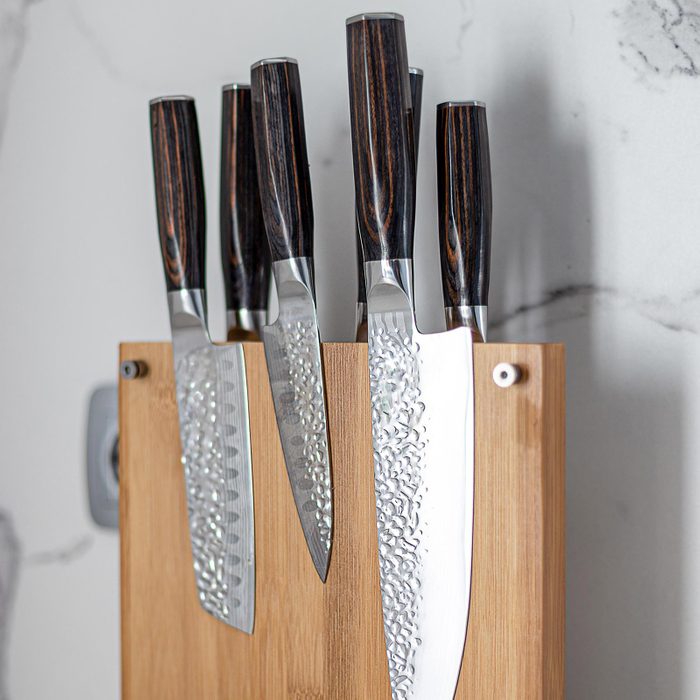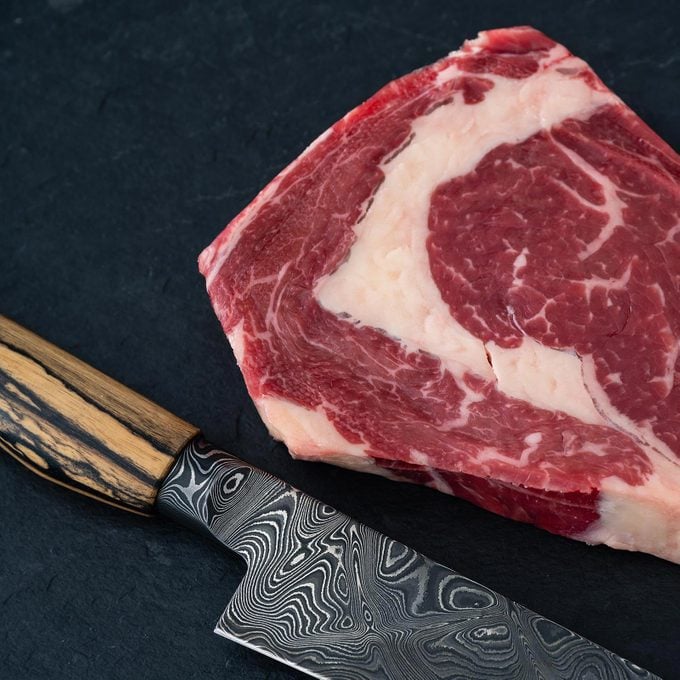What Is a Damascus Chef Knife, and Why Do I Need One?
Updated: Jan. 03, 2023

A Damascus chef knife will transform your kitchen from everyday to gourmet.
If you’ve never heard of Damascus chef knives until recently, you’re not alone. The centuries-old steel forging process has remerged, and modern technology has given scientists the ability to recreate the durable, resilient and beautifully adorned material.
Damascus chef knives are becoming increasingly common kitchen staples, and if your kitchen knives simply aren’t cutting it, you may want to consider these knives as an upgrade.
What Is a Damascus Chef Knife?

Damascus steel can be traced all the way back to 300 B.C., though it didn’t become popular around the world until the 11th century when it was used in weaponry during the Crusades. The signature hallmark of Damascus steel knives is the swirling patterns on the blades. The methods for making these intricate and sturdy knives were lost to history, but in the 1980s, scientists found a way to recreate Damascus steel. The material is not pure metal, but an alloy with several impurities and high carbon percentages, the combination of which results in gorgeous, strong and sharp knives.
Damascus steel can be used to produce a wide array of knives ranging from kitchen knives to utility knives as well as countless non-kitchen items like auto parts. One of the most popular types of Damascus knives, however, is the chef’s knife. Damascus chef knives can be made from either stainless steel or carbon, and each material has its benefits. The strength of the knife corresponds to the material from which the blade was forged, and carbon is by far the hardest and most durable knife. On the other hand, stainless steel knives are much easier to care for and have the perfect blend of ductility, sharpness and resistance. Stainless steel Damascus knives are also resistant to corrosion, which is another important feature of any chef’s knife.
Is a Damascus Chef Knife Good to Use in the Kitchen?
In recent years, Damascus chef knives have been popping up in kitchens all around the world. Damascus knives are incredibly sharp in comparison to other popular types of chef knives and their edges stay sharper longer. Perhaps even more unique are the designs and patterns on them, which make them not only an essential cooking tool, but a piece of artwork on display in your kitchen. It’s no surprise that this blend of durability, functionality and art makes Damascus knives a must-have in the kitchen.
How to Take Care of Damascus Chef Knives
The key to ensuring your knives have a long life is proper care. Once you invest in Damascus chef knives, consider the following tips to keep them meal-prep-ready at all times.
- Wash and dry knives immediately after each use to ensure that organic material left on the blade does not have time to degrade the steel.
- Dry carbon Damascus blades after washing to prevent rust and corrosion.
- Sharpen your kitchen knives‘ blades regularly.
- Polish blades with non-abrasive polishing clothes to preserve delicate Damascus designs and patterns.
- Avoid putting Damascus knives in the dishwasher, and make sure you don’t abuse your kitchen knives in any other way.
Ultimately, Damascus knives made from stainless steel require less maintenance and care than those made from carbon, so if polishing your knives doesn’t strike you as a fun weekly chore, consider going with the stainless steel variety.




















